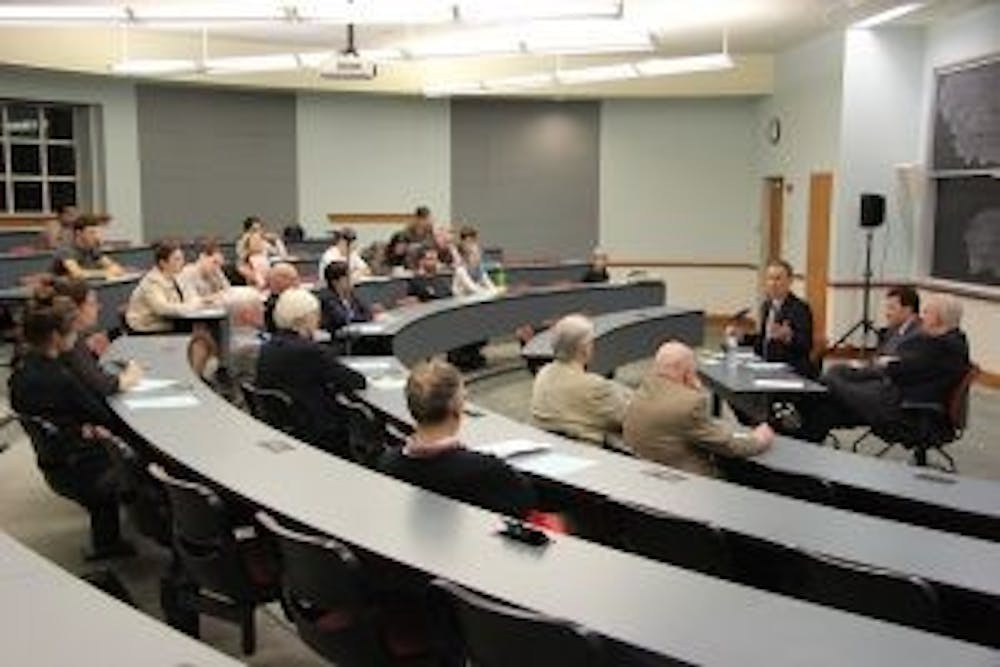Professor Michael Dorf, the Robert S. Stevens Professor of Law at the Cornell University Law School gave a lecture titled “Does the Dead Constitution Have a Future?: Reflections on the Legacy of Justice Antonin Scalia” on Tuesday at 8 pm in Hodson Hall in an event hosted by The Academy at Johns Hopkins.
Dorf’s overarching goal was to discuss the past and future of originalism and the dead constitution, in the context of Justice Scalia’s legacy Originalism is the belief that the constitution should be read in its historical context. Scalia was a leading supporter of this strand of constitutional interpretation.
Scalia once stated, "The Constitution that I interpret and apply is not living but dead, or as I prefer to call it, enduring. It means today not what current society, much less the court, thinks it ought to mean, but what it meant when it was adopted.”
Dorf began by giving a brief history of originalism. Originalism is often used synonymously with the term original intent, the idea that one can divine meaning from the constitution by determining what the framer’s intentions were.
However, this view of originalism became problematic because of the difficulty in determining and accounting for all the subjective views of the contributors of the constitution. Dorf explained that the theory of original intent began to lose popularity and gave rise to the theory of original meaning, a theory which Scalia criticized.
“I would say nobody played a greater role in undermining the idea of original intent than Justice Scalia,” Dorf said. “Justice Scalia contrasted the idea of original intent - not he alone, but he was the most prominent to do so - with original meaning, sometimes called original public meaning. There’s a difference between what the people who wrote the words, or ratified the words, subjectively intend or expected to happen versus what an ordinary speaker of the language at the time understood the meaning of those words.”
While Justice Scalia favored originalism because he found that it constrained judicial discretion against ideological bias, Dorf didn’t believe that originalism accomplished this goal. He pointed out that Justice Scalia voted in such an ideologically predictable way that it’s impossible to say that he was limiting his decisions through the use of originalism.
Today, originalism is often used as a political rhetorical device, allowing its supporters to claim objectivity and neutrality while also appealing to people who share similar ideologies, which often favors conservative results. Dorf noted that many Republican hopefuls in the primary election praised originalism in order to use it to their benefit.
In looking to the future of the Supreme Court, Dorf believed that the bench will become more liberal and advised liberal justices to adopt formalist perfectibility. This is the idea that the law has the potential to be progressive. This idea was first submitted by Frederick Douglass.
“Douglass has this idea that the text itself, unmediated by its original meaning and evolving meaning, embodies certain principles and the goal is to sort of live them out,” Dorf said. “Douglass’ idea which is what I’m suggesting as an alternative to originalism for liberals is that the constitution itself always had these ideas in it and it’s a question of perfecting it.”
Dorf also spoke about the current presidential election, arguing that a Trump or Clinton presidency will have equally drastic effects on the Supreme Court.
“The answer to the question whether the dead constitution has a future depends partly on the outcome of the election and depends partly on how liberals respond to the challenge posed by originalism,” he said.
Dorf noted that although he studied physics as an undergraduate student and thought about going into patent law, he became interested in constitutional law after having an inspiring constitutional law professor. Dorf thought that people should know about the constitution because of its effects in our society today.
“I don’t think the constitution is inherently important, but it structures so much of our public policies and discussions,” he said. “It affects all sorts of things, not just in terms of the issues that the Supreme Court decides directly, but understanding the constitutional system will tell you things about the separation of powers, federalism, the electoral college... The constitution is the kind of framework on which almost all of our politics takes place.”
Formithia Hurte, the administrative coordinator for both the Krieger School of Arts and Sciences dean’s office and the Academy at Johns Hopkins, discussed the Academy’s goals in holding lectures.
“The Academy is a group of retired professors who taught here at Johns Hopkins and I believe that their wisdom and influence would be good for undergraduates just to come out and hear what they have to talk about,” Hurte said.
Loyola University senior Matt Masino attended the lecture at the recommendation of one his professors and enjoyed the talk.
“I thought [his remarks] were very good and very well founded,” he said. “I disagreed with the fundamentalist part where he talked about progressivist thought and how that is basically in the constitution, because it can be interpreted both ways. But I can understand why he says that can be a pullback from the conservative’s point of view of originalism.”
Masino also believed that it was important for students to be informed about constitutional law.
“I think it’s very important to learn about originalism and the constitution because that’s the foundation of our law and unless we understand that, we’re not going to be able to progress as a society,” he said. “That has to be a consistent thread throughout the Supreme Court’s decisions, no matter who’s on the bench. I think it needs to be preserved, rather than forgotten.”





